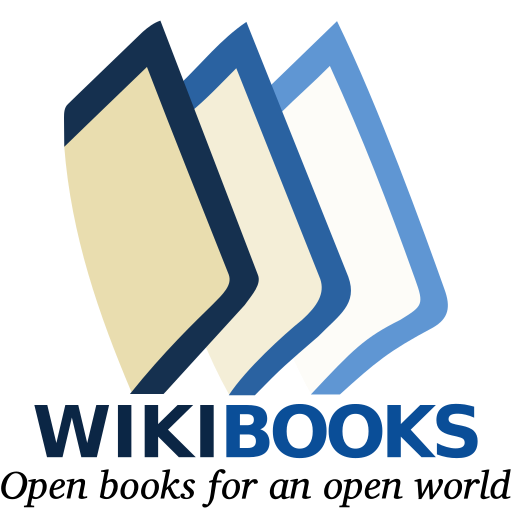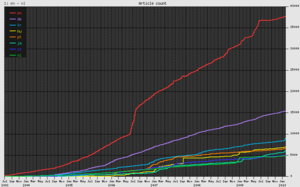Wikibooks: Difference between revisions
No edit summary |
|||
| Line 4: | Line 4: | ||
==History== |
==History== |
||
[[Image:Wikibooks growth.png|thumb|300px|Growth of the largest six |
[[Image:Wikibooks growth.png|thumb|300px|Growth of the largest six Wikibooks sites (by language).]] |
||
Started on [[July 10]], [[2003]], the project is a collection of free [[textbook]]s, manuals, and other texts that are written collaboratively on the website. The site is a [[wiki]], meaning that anyone can edit book modules without their contributions being subject to review before modifications are accepted. |
Started on [[July 10]], [[2003]], the project is a collection of free [[textbook]]s, manuals, and other texts that are written collaboratively on the website. The site is a [[wiki]], meaning that anyone can edit book modules without their contributions being subject to review before modifications are accepted. |
||
Revision as of 15:48, 18 June 2006

Wikibooks, previously called Wikimedia Free Textbook Project and Wikimedia-Textbooks, is a wiki specialising in creating books. It is part of the Wikimedia Foundation.
History

Started on July 10, 2003, the project is a collection of free textbooks, manuals, and other texts that are written collaboratively on the website. The site is a wiki, meaning that anyone can edit book modules without their contributions being subject to review before modifications are accepted.
The project was opened in response to a request by Wikipedia's Karl Wick for a place to start building open-content textbooks such as organic chemistry and physics in order to reduce the costs and other limitations on learning materials.
Content
While some books are original, others began as text copied over from other sources of free-content textbooks found on the Internet. All of the site's content is covered by the GNU Free Documentation License. As with its sister project, Wikipedia, contributions remain the property of their creators, while the copyleft licensing ensures that the content will always remain freely distributable and reproducible to allow for further collaboration.
The site is working towards completion of several textbooks in numerous languages, which founders hope will be followed by mainstream adoption and use of texts developed and housed there.
Criticisms
Wikibooks has many incomplete texts, and many argue that even the comprehensive texts (books rated at the highest level) are of poor quality. The wiki model encourages the creation of abortive book projects that linger indefinitely without being improved or deleted, and it can be extremely hard for a visitor of the Wikibooks site to find any high-quality, completed books. The HTML format of the compiled Wikibooks is not suitable for the traditional printing of books with fixed page-width and page-length, and the Wiki syntax is considered ill-suited for professional book editing. Wikibooks also inherits all the criticisms levelled towards wiki-style editing in general.
Subprojects
There are two subprojects within Wikibooks: Wikijunior and Wikiversity. Wikijunior is a youth print and online content project. Wikiversity is a free, open learning environment and research community. It has been proposed that Wikiversity become a project on equal standing with Wikibooks and other Wikimedia Foundation projects.
References
- "All Systems Go: The Newly Emerging Infrastructure to Support Free Books". Ben Crowell. Retrieved June 18.
{{cite web}}: Check date values in:|accessdate=(help); Unknown parameter|accessyear=ignored (|access-date=suggested) (help)
Other languages
See also
- Digital library
- EBook
- ibiblio
- Open Content Alliance
- Project Gutenberg
- Universal library
- Virtual library
- wikiHow - a for-profit site with a collection of how-to guides
